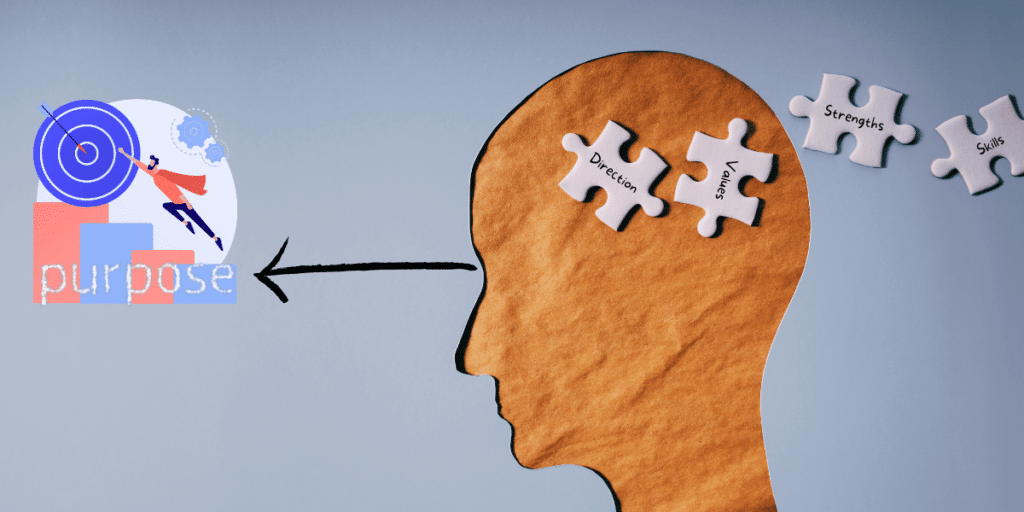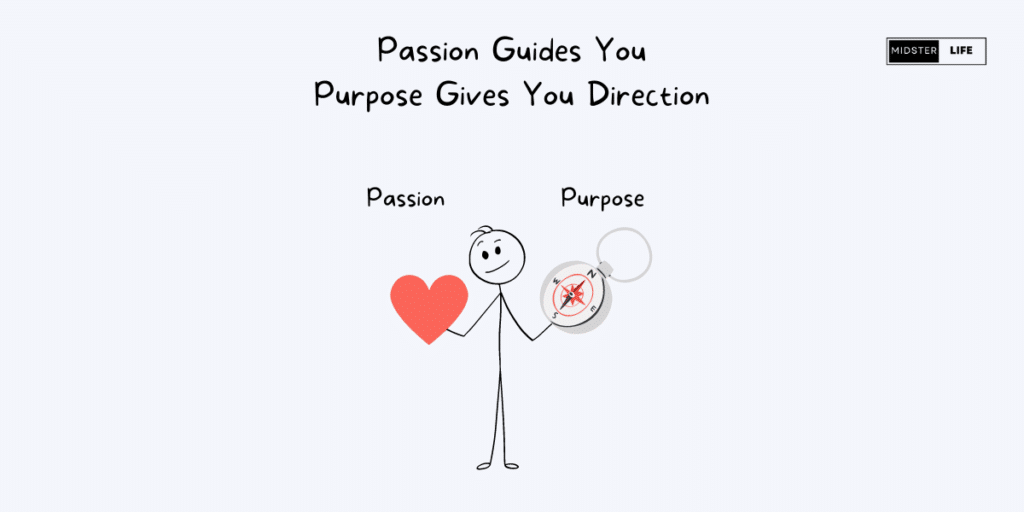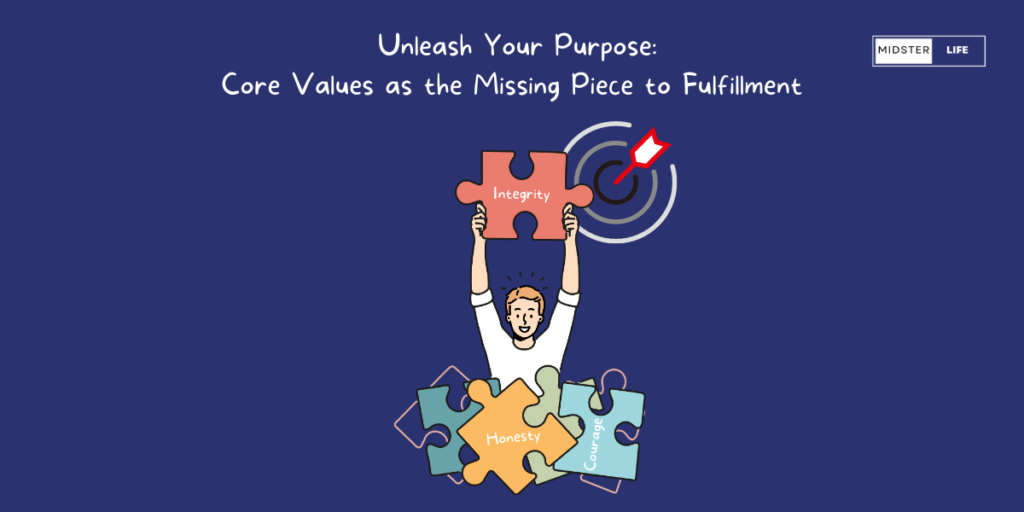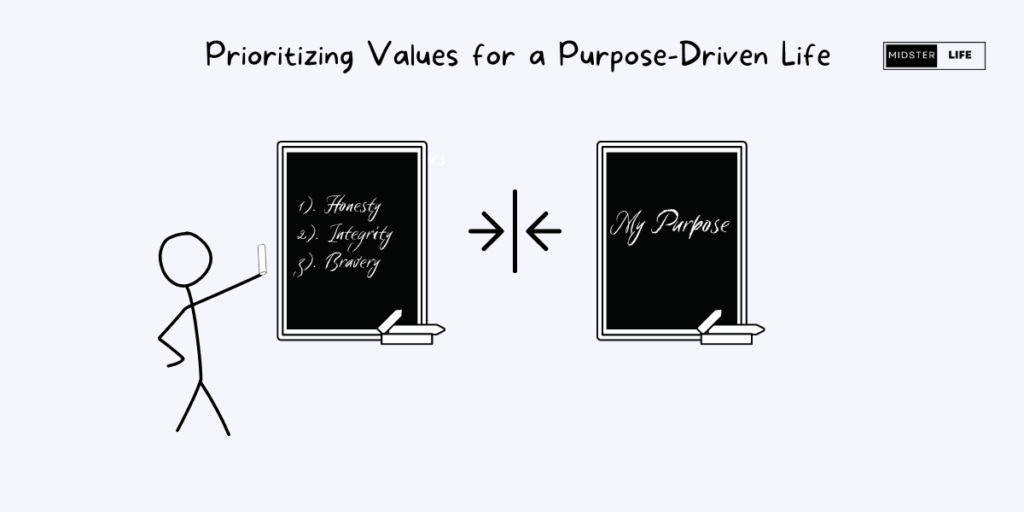From Lost to Found: Seizing Your Purpose After 40

Finding Purpose after 40
“So, What do you do?”
I was on vacation in California at my wife’s friend’s house party. It was warm, chilled, and great fun. But these five words uttered with no malice shattered that vibe almost instantly.
This was always the one question that would send my stomach into knots and my heart rate through the roof.
I hesitated momentarily before responding. The familiar feeling of emptiness washed over me as I explained my job.
Well, I tried to explain my job. I stuttered and stammered a response that told the guy my job title and the company I worked for. Blindly hoping that would be enough for him to leave me alone and move on.
But it wasn’t. He looked at me confused, then said pretty bluntly:
“No – what do you DO?”.
I couldn’t answer. I obviously knew what I DID, but it was just a job.
It was a good job– in a traditional sense, working for a big Pharma company. But nothing in the role gave me any sense of purpose, direction, or fulfillment.
It didn’t light my fire. It bored me. And if you find something boring, it’s pretty damn hard to make it sound exciting.
I flapped for another minute, squirming uncomfortably, before throwing the towel in. “Oh, I really don’t like my job.”
“I can see that,” came the response.
And at that moment, it hit me that I was stuck in a rut, lacking a true sense of direction. Something needed to change.
But that experience also made me realize that I probably wasn’t alone. I’m sure many of you have found yourselves in a similar situation, questioning your purpose in life and wondering how you can break free from the monotony.
But the good news is that it’s never too late to discover your purpose. If you take the time to explore what truly matters to you, you can gain direction, meaning, and a greater sense of authenticity.
Let’s start your journey today and see if we can help you find direction and reignite your passion for life.
Understanding Purpose

As you move through your 40s, you may feel like you’ve lost your way. Even if you think you’ve achieved some of the goals you set for yourself, it’s normal to question whether you are still on the right path.
Where you are now is a direct result of the decisions and actions you’ve made in the past. But the values that drove those decisions may have changed, and those goals may feel unaligned with the person you are now.
So if you’re starting to feel off balance in one or more areas of your life, it could be that you are ready for a change, and it’s ok if you don’t know where to start. That’s where understanding our purpose comes in.
Defining Purpose: What It Is and What It Isn’t
Reker (1997) p710 defined purpose as “having a sense of direction, a sense of order, and a reason for existence, a clear sense of identity, and a greater social consciousness”.
At its core, purpose is about understanding what really matters to us. Understanding what makes us tick and lights us up with energy and excitement. But more than this, it’s about that sweet spot where our values, strengths, and skills combine in a unique way that positively impacts the world around us. And this isn’t about just making money or achieving goals; it’s about aligning actions with our values and contributing something of value to the wider community.
Why Purpose is Important?
Purpose is important for several reasons. There is a wide body of research that suggests having a sense of purpose can promote mental well-being, increase job satisfaction and engagement, and even lower mortality risk. Having a purpose in life can guide life decisions, shape our goals and create a sense of meaning and direction.
The Difference Between Purpose and Passion

It’s common for people to use purpose and passion interchangeably. However, they are different. Passion is about what we enjoy doing, while purpose is about what we feel called to do, and this is not always the same thing.
Passion is important, but it may not always align with our purpose. For example, you may be passionate about playing guitar, but that may not be your purpose. However, if you use your guitar skills to start a music therapy program for cancer patients instead. Now that might be your purpose!
Common Misconceptions About Purpose
It’s also important not to let misconceptions about purpose keep you from discovering your true calling. You may think that purpose is something you’re born with and can’t change, but it can evolve as you gain new experiences and insights. Your past experiences, interests, and future adventures can lead you to a purpose you may never have envisaged earlier in your life.
And don’t believe the myth that purpose is only for the wealthy or privileged. Regardless of their background or circumstances, everyone can discover their purpose and live a life of greater meaning and impact.
For example, successful entrepreneur John Paul DeJoria went from being a school janitor to creating multi-billion dollar hair and beauty business. He also set up a non-profit foundation to seek solutions to landmine problems worldwide. So don’t let your past hold you back, take the first step toward your purpose today.
Identifying Your Values

The first step in identifying your purpose is to get a better understanding of what your core values are. Your values are the beliefs and principles that guide your life and shape your decisions.
Examples of these include someone who values honesty above all else. Even if they make a mistake, they would rather be honest about it rather than hide it. Someone else may value creativity and therefore spend their time seeking out new ways to express themselves.
Each of us will have our own unique set of values shaped by our life experiences. These values will form the foundation of our decision-making process and play a vital role in helping us find our purpose in life.
Understanding the Role of Values in Finding Your Purpose
Before we can identify our values, we must understand their role in finding our purpose.
Our values are the compass that guides us toward a fulfilling life. When we align our actions with our values, we feel a sense of purpose and fulfillment.
On the other hand, when we act against our values, we feel a sense of discomfort and dissatisfaction. For example, if you value equality, you may feel uncomfortable speaking at an event that lacks adequate representation across diverse groups. Or, if health is something that you value highly, you will feel uncomfortable eating fast food or junk food, even if it is convenient and affordable.
By having a clear understanding of what your core values are, you can ensure you consistently make decisions that are in alignment with them, and this will drive you closer to finding your purpose.
Techniques for Identifying Your Core Values

Some of you may already have a clear idea of what your core values in life are. But for others, this may be challenging, and you may need to devote some time to better understanding the guiding values in your life that are important to you.
But it’s ok if you’re not clear yet; you can utilize several techniques to identify your core values:
- Reflect on the times when you felt happiest and most fulfilled.
- Think about the people you admire and the qualities that you admire in them.
- Consider the things that you are willing to fight for or sacrifice for.
- Take time to assess what your character strengths are.
- Character strengths are positive traits that reflect who you are as an individual. They include qualities such as creativity, curiosity, kindness, and perseverance. By identifying your character strengths, you can gain a better understanding of what makes you unique and how you can use your strengths to achieve your goals.
- The VIA Character Strengths Survey is a free assessment that can help you discover your strengths and how to use them in your personal and professional life. Use the results to guide your decision-making and to help you discover your purpose.
It’s important to note that your values may change as you grow and evolve. Therefore, you should regularly reassess your values to ensure that they align with your current beliefs and goals.
Prioritizing Your Values and Aligning Them with Your Purpose

Once you have identified your core values, the next step is to prioritize them and consciously incorporate them into your daily life and decision-making processes. By doing this, they will guide you toward a greater sense of fulfillment and purpose.
Start by asking yourself these questions:
- Which values are most important to you?
- It’s important to recognize this can change over time. What we value when we are younger may not be the same as we age. For example, early in your career, you may have placed more value on financial stability, but now, in your 40s, you may have achieved that goal already and want to prioritize personal growth or creativity.
- How can you incorporate your values into your daily life?
- What small changes can you make to your life to ensure you prioritize your most important values? This could be setting aside time each day for a hobby or interest or potentially something more significant such as spending time each day looking for a new job that better aligns with your values.
- How can you use your values to guide your decision-making process?
- When tackling difficult decisions, try approaching the decision from the perspective of your values. Out of all the options, which one most closely aligns with your values? For example, if integrity is important to you, you may choose to speak up about a problem at work, even if it risks negative consequences.
- How can you use your values to contribute to a greater cause?
- Can you take any actions to align what you contribute to the broader community closer to your values? Can you make a positive impact on those around you? For example, if one of your values is environmental sustainability, are there any opportunities to volunteer either within your current employer or an external organization where you can help implement steps to reduce their carbon footprint?
By answering these questions, you can create a roadmap for a fulfilling and purposeful life by prioritizing your values and aligning them with your purpose.
Living Your Purpose After 40

So let’s assume you’ve devoted hours to introspection, and you now know your core values and where you want to go in life.
It’s now time to start living it. This can be daunting, but with the right mindset and strategies, you can turn your purpose into a reality.
Turning your purpose into actionable goals
With a clear end goal, you need to break down the actions into smaller, achievable steps. For example, if you want to start a non-profit organization, your actionable goals could be to research similar organizations, create a business plan, and start fundraising.
By breaking down your goal into smaller steps, you can create a roadmap to success.
Make these steps SMART – specific, measurable, and time-bound. This means setting clear deadlines and tracking your progress along the way.
By doing this, you can ensure that you hold yourself accountable and are making steady progress toward your purpose.
Embracing the journey of living your purpose after 40
And finally, living your purpose can be challenging, and there will be obstacles along the way. However, it’s important to try to enjoy the journey and not just focus on the end result. Embrace the ups and downs of the process, take note of the small things that feel like wins, and use them as motivation to get through the tough times when self-doubt kicks in.
Try to practice self-care. Changing any significant aspect of your life will bring times of stress. You may feel confused, frustrated, and lost, so taking care of yourself physically and mentally is essential. Understanding what your stress triggers are and putting in place strategies to mitigate these will help you ensure you don’t burn out in pursuit of your goals.
Your mindset can significantly impact how you approach the challenges of your 40s and your journey toward finding and implementing your purpose. Try building your mental muscles, and develop a growth-orientated mindset by incorporating these mindset strategies. This could mean practicing mindfulness, exercising regularly, or taking time for hobbies and activities that bring you joy.
Finding and living your purpose is a lifelong journey, and it’s never too late to start. You can live a more fulfilling and purposeful life by turning your purpose into actionable goals, integrating it into your daily life, and embracing the journey.
Start your journey today!


